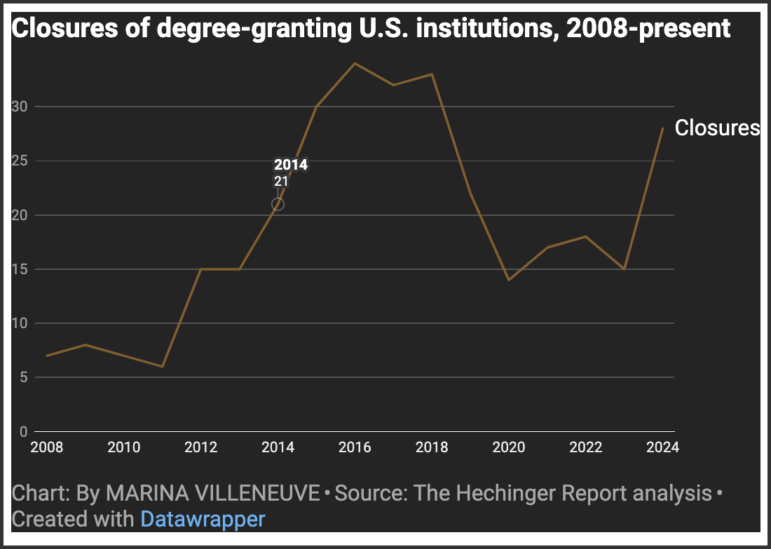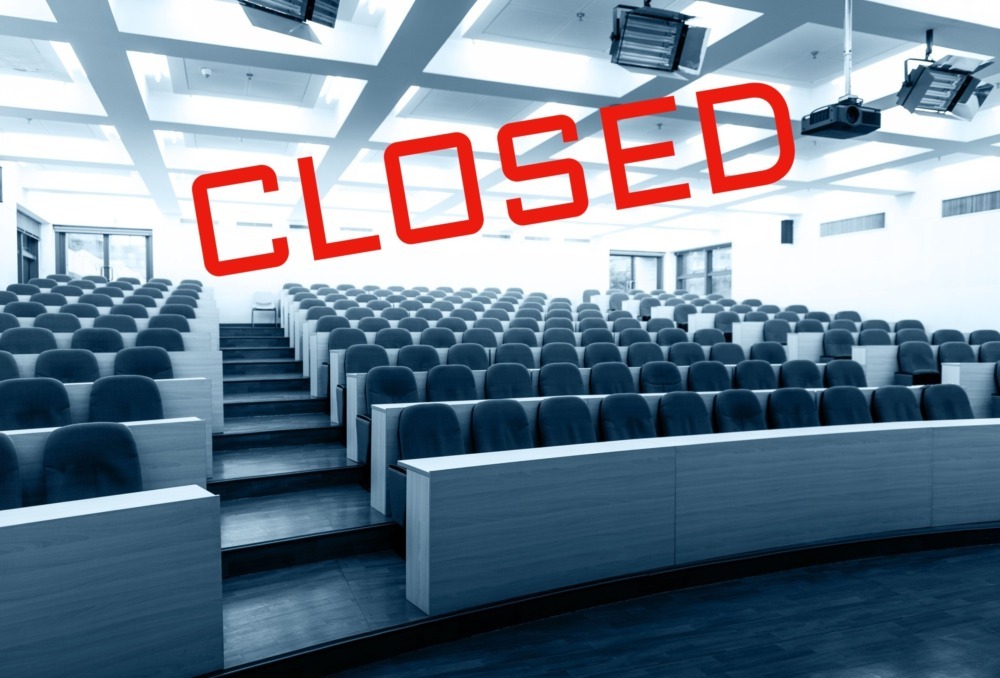This story was as produced by The Hechinger Report.
More colleges are shutting down as enrollment drops.
College enrollment has been declining for more than a decade, and that means that many institutions are struggling to pay their bills. A growing number of them are making the difficult decision to close.
In the first nine months of 2024, 28 degree-granting institutions closed, compared with 15 in all of 2023, according to an analysis of federal data provided to The Hechinger Report by the State Higher Education Executive Officers Association or SHEEO.

Earlier this year, our colleague Jon Marcus reported that colleges were closing at a rate of nearly one per week. The Hechinger Report has created a tool to track these changes in the higher education landscape. Readers can search through the archive of colleges that have closed since 2008, and we will update it periodically with the latest shutdowns.
The numbers are staggering.
Nearly 300 colleges and universities offering an associate degree or higher closed between 2008 and 2023.
For-profit operators ran more than 60 percent of those colleges and universities.
From 2008 to 2011, an average of seven colleges and universities shut down each year in the wake of the financial crisis. That four-year average had doubled to 14 by 2014 before reaching 32 by 2018.
In recent years, the annual number of closures began to plateau, with an average of 16 colleges and universities closing between 2020 and 2023.
Hundreds more post-secondary institutions offering non-degree programs – from cosmetology to midwifery to manufacturing schools – have shuttered over the past 15 years. When we added in these post-secondary institutions, we tallied 843 closures between 2008 to 2023.
“It’s not corruption; it’s not financial misappropriation of funds; it’s just that they can’t rebound enrollment,”
said Rachel Burns, a senior policy analyst at SHEEO, who provided the closure data to The Hechinger Report.
See which schools have closed
Scroll the list using the right margin scroll bar. Click the colored bar under each school for more details.
Why are colleges closing?
Covid-related enrollment dips have mostly stabilized, but colleges are still dealing with:
- a declining birth rate, and,
- fewer 18-year-olds graduating from high school.
At the same time, many parents don’t think their financial investment in their child’s college tuition will pay off.
The result is fewer students enrolling and far fewer tuition dollars coming in.
And when colleges close, it hurts the students who are enrolled. At the minimum, colleges that are shutting down should notify students at least three months in advance, retain their records and refund tuition, experts say. Ideally, it should form an agreement with a nearby school and make it easy for students to continue their education.
[Related: Colleges are now closing at a pace of one a week. What happens to the students?]
A SHEEO study of students from closed colleges found that only about half transferred to other institutions, and the chances of those students earning a degree varied depending on several factors including how long it took them to re-enroll.
***
Marina Villeneuve is an investigative reporter with a passion for uncovering inequality. Previously, she covered Trump’s legal battles and the Supreme Court for Salon. She was an investigative producer at a local Boston television station, where she specialized in data reporting and led an Emmy award-winning investigation into abuse at public schools. Villeneuve was also a statehouse reporter for The Associated Press covering New York and Maine. She covered Colombian peace negotiations for the Washington Post and Congress for the L.A. Times and Gannett Washington Bureau. Villeneuve is a board member of Investigative Reporters and Editors.
Olivia Sanchez is a higher education reporter. She previously covered local and state government for the Capital Gazette in Annapolis, Maryland, and reported for USA Today.
The Hechinger Report, is a nonprofit, independent news organization focused on inequality and innovation in education. The Hechinger Report provides in-depth, fact-based, unbiased reporting on education that is free to all readers, keeping educators and the public informed about pressing issues at schools and on campuses throughout the country. Sign up for Proof Points and other Hechinger newsletters.
This story also appeared in Mind/Shift.






























